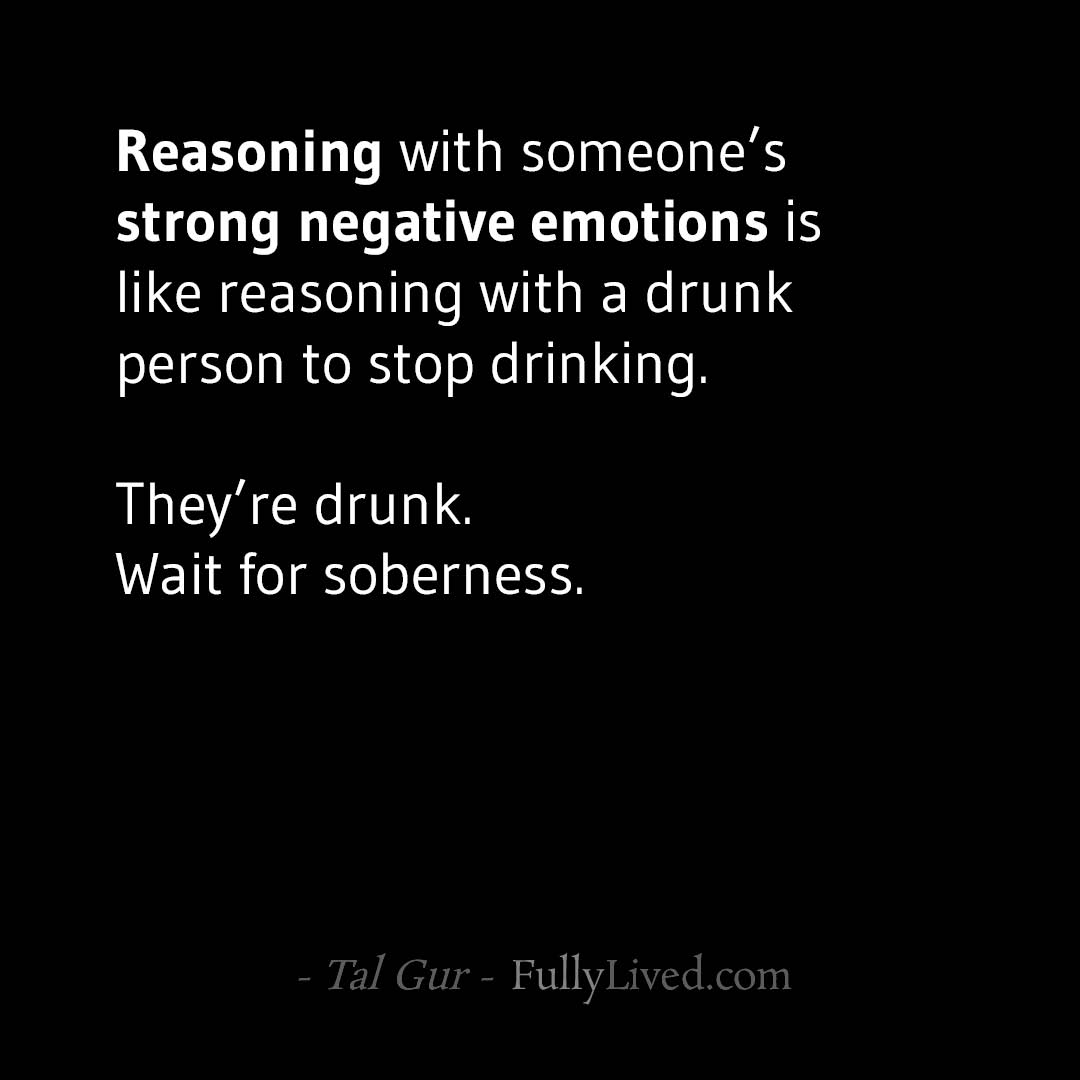Reasoning with someone’s strong negative emotions is like reasoning with a drunk person to stop drinking. They’re drunk. Wait for soberness.
Imagine trying to have a rational conversation with someone who's deep in the throes of anger or despair. It's like trying to navigate through a dense fog; no matter how loudly you shout, your words get lost in the haze. This quote encapsulates the futility of reasoning with someone who is consumed by intense negative emotions. It's akin to trying to convince a drunk person to put down the bottle – a task rendered almost impossible by the intoxicating grip of alcohol.
Think about it this way: when someone is in the grip of strong negative emotions, their rational faculties are impaired, much like a drunk person's judgment is clouded by alcohol. Just as it's ineffective to engage in a logical debate with someone who's intoxicated, trying to reason with someone who's overwhelmed by their emotions often leads to frustration and misunderstanding.
Consider a sailboat caught in a raging storm. The winds howl, the waves crash against the hull, and the crew struggles to keep the vessel afloat. In such turbulent conditions, attempting to have a calm discussion about navigation or sail trimming would be ludicrous. Similarly, when someone is caught in the tempest of their emotions, expecting them to engage in reasoned discourse is like asking the sailors to adjust the sails while battling a hurricane.
But just as the storm eventually passes, so too do intense emotions ebb away with time. Waiting for the storm of emotions to subside is akin to waiting for a drunk person to sober up – it's only when clarity returns that meaningful dialogue becomes possible. Just as a hangover grants the drinker a clearer perspective, the passage of time often allows individuals to regain their emotional equilibrium and approach discussions with a calmer mindset.
Imagine a pot of boiling water on a stove. When the flames are high and the water is roiling, attempting to insert a delicate ingredient for seasoning would be futile; it would simply get lost in the chaos. However, when the heat is turned off and the water settles, the ingredient can be added, allowing its flavor to infuse gently. Similarly, waiting for emotions to cool allows for more effective communication, enabling thoughts and feelings to blend harmoniously.
In the heat of the moment, it's easy to react impulsively, to lash out or retreat into silence. But just as pouring gasoline on a fire only fuels the flames, engaging in conflict during times of emotional turmoil often exacerbates the situation. Instead, patience and understanding serve as a cooling balm, soothing frayed nerves and paving the way for productive dialogue.
Picture a pair of dueling knights, swords clashing in a tumultuous battle. In the heat of combat, neither combatant can hear reason over the clangor of metal against metal. But when the dust settles and the swords are lowered, adversaries can become allies, finding common ground in the aftermath of conflict. Similarly, waiting for emotions to subside allows for adversaries to become collaborators, fostering understanding and reconciliation.
So, the next time you find yourself faced with someone consumed by strong negative emotions, remember this: just as you wouldn't reason with a drunk person to stop drinking, attempting to engage in rational discourse with someone in the grip of intense emotions is an exercise in futility. Instead, exercise patience, wait for the storm to pass, and approach the conversation with empathy and understanding.
How can you practice patience and understanding in your interactions with others, especially when emotions run high?**
* If you’re seeking extra motivation and inspiration on your journey of personal growth, I recommend taking a look at my SMART growth goals page, This page offers thousands of goal ideas that can assist in the establishment of new aspirations and the attainment of greater heights in one's life. In fact, it was instrumental in my creation of a list of 100 goals, which I pursued for a decade.
Chief Editor
 Tal Gur is an author, founder, and impact-driven entrepreneur at heart. After trading his daily grind for a life of his own daring design, he spent a decade pursuing 100 major life goals around the globe. His journey and most recent book, The Art of Fully Living, has led him to found Elevate Society.
Tal Gur is an author, founder, and impact-driven entrepreneur at heart. After trading his daily grind for a life of his own daring design, he spent a decade pursuing 100 major life goals around the globe. His journey and most recent book, The Art of Fully Living, has led him to found Elevate Society.























